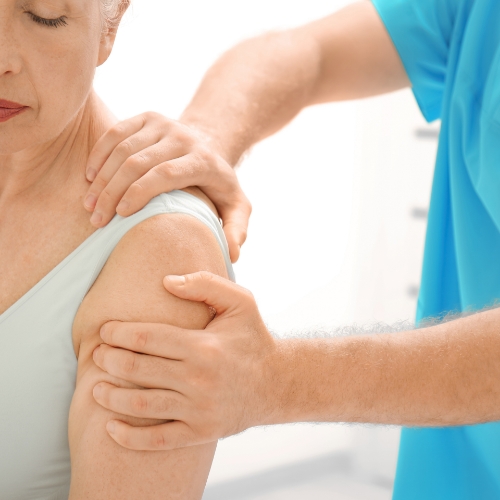Shoulder Pain Relief Is Closer Than It Seems At Maximum Rehabilitation Services in Chicago, IL, Evergreen Park, IL, and Munster, IN!
Most people don’t realize how much they use their shoulders throughout the day until they start hurting or are injured. From basic activities like getting dressed or preparing a meal to more vigorous activities like lifting and playing sports, the health of our shoulders is vital to our ability to function normally.
If your shoulders irritate you, you’ll be aware of a problem as soon as you try to reach for something or scratch your back. It’s not always easy to find relief from shoulder pain on your own, so when shoulder pain starts, it’s a good idea to get help from our physical therapy team!
Regardless of what is making you uncomfortable, we can assist!
Maximum Rehabilitation Services in Chicago, IL, Evergreen Park, IL, and Munster, IN use research-backed, science-based techniques to provide you with treatments that provide lasting relief for your shoulder pain. Most shoulder disorders respond to physical therapy treatments so that you can avoid strong medications, surgical procedures, or other invasive treatments!
Why does my shoulder hurt?
Shoulder pain can range from mild aches and pains to severe pain and disability. Injuries to the muscles surrounding the shoulder (i.e., rotator cuff) or the joint itself can leave you unable to lift your arm or tolerate lying on it at night.
A variety of things can cause shoulder pain. You might have been in a car accident, pulled a muscle, or have arthritis. Whatever the source of your pain, our team can help!
Here are some common causes of shoulder pain for which you can seek treatment in Chicago, IL, Evergreen Park, IL, and Munster, IN:
Rotator cuff injuries
The rotator cuff is a group of four muscles of the upper arm that serve to dynamically stabilize the shoulder and play a vital role in the shoulder and arm movements.
Shoulder soreness, arm weakness, difficulties reaching behind the back, and sleeping problems are all symptoms of rotator cuff injury.
Although some mild rotator cuff injuries can heal on their own, physical therapy can help ensure you resolve your condition thoroughly and prevent future problems without the need for surgery. However, if surgery is required, physical therapy will be an essential piece of the recovery process!
Impingement
Shoulder impingement describes a condition where a rotator cuff tendon(s) is pinched as they pass between the top of the upper arm (humerus) and the tip of the shoulder blade (acromion).
Pain, weakness, catching, and an inability to move the shoulder joint fully, specifically when you raise your arms overhead or to the side, are typical symptoms of impingement. It is common to have difficulty lying on the painful side, and sleep is often disrupted.
Although several contributing factors, including posture and muscle weakness, degenerative changes, and osteoarthritis, are typically responsible for this condition. Fortunately, one of our physical therapy clinics in Chicago, IL, Evergreen Park, IL, or Munster, IN can help you with any of these problems!
Tendinopathy
Tendonopathy describes any problem with a tendon, including disease, injury, or disorder.
Tendinitis is inflammation of the tendons in the shoulder, including the rotator cuff and biceps tendons. Acute injuries, including minor or partial tearing, can produce an inflammatory response typical of tendonitis.
Tendinosis describes a dysfunctional tendon and typically does not specify the pathological process. This condition is associated with overuse-type conditions and degenerative changes that lead to micro-tearing and pain. These tendon injuries are not associated with inflammation, and anti-inflammatory medications may delay their healing!
When tendons become injured or inflamed, any movement can cause pain or feel weak, especially when you raise your arm to the side or overhead.
Arthritis
The two most frequent kinds of arthritis that affect the shoulder are osteoarthritis and rheumatoid arthritis. Both result in deterioration of the cartilage in the shoulder joint. The more severe the degeneration, the more challenging daily tasks become.
Osteoarthritis is common in both active and inactive populations. Although most cases of osteoarthritis have no known cause, arthritis often develops after a traumatic event and/or repetitive stresses after an injury. There is also evidence that a genetic component makes you more susceptible to developing this condition. Regardless of how it starts, it typically leads to the loss of articular cartilage, pain, and inflammation.
Rheumatoid arthritis is an autoimmune disease that causes the immune system to target the membranes surrounding the shoulder joint. Discomfort and inflammation are symptoms of this illness.
Instability and labral tears
Shoulder instability is described as the ball of the shoulder joint (humeral head) moving either completely or partially out of the socket (shoulder blade). The most common causes of instability occur when the lining of the shoulder joint (the capsule), ligaments, or labrum become stretched, torn, or detached.
A labral tear occurs when there is an injury to the ring of cartilage in the shoulder joint. Some labral tears increase the potential for shoulder partial and complete dislocations.
Symptoms of a labral tear may include the following symptoms:
Pain and/or catching with specific shoulder joint movements, Typically a dull throbbing ache, Difficulty sleeping, and Partial or full dislocations of the shoulder joint
Frozen shoulder
Frozen shoulder (aka adhesive capsulitis) is characterized by stiffness, loss of range of motion, and pain in the shoulder joint. Most often, the symptoms begin gradually and worsen over time. Most symptoms typically resolve on their own within one to three years.
If you are experiencing pain, loss of motion, and a constant feeling of tightness in the shoulder joint, you might have a frozen shoulder and need a physical therapist to guide you back to health!

Shoulder pain relief with physical therapy in Chicago, IL, Evergreen Park, IL, and Munster, IN
Physical therapy is a safe, non-invasive, highly effective treatment for shoulder discomfort. Physical therapists at Maximum Rehabilitation Services have proven results in treating various shoulder problems and, in some cases, significant relief in just a few sessions!
Our physical therapist will assess several aspects of your shoulder’s overall health. Some of these include:
- Range of motion
- Strength
- Joint motion mechanics and overall upper extremity function
- Coordination
Once the cause of your shoulder pain has been identified, our physical therapist can start to work to resolve your pain, weakness, and dysfunction. Our team will provide a personalized treatment program to manage and, in some cases, abolish your pain.
Our physical therapists will use targeted manual therapy to alleviate soft tissue restrictions, increase circulation, and restore your shoulders’ range of motion.
In most cases strengthening exercises will be part of your treatment plan and home exercise program to help prevent future shoulder issues! Physical therapy at Maximum Rehabilitation Services in Chicago, IL, Evergreen Park, IL, and Munster, IN can help you resolve your shoulder pain once and for all!
Request an appointment with our physical therapy clinic for shoulder pain relief
If you’re struggling with shoulder pain, we can give you the help you need to get back to doing the things you enjoy without pain!
Your Next Steps…
Request An Appointment
Receive A Custom Treatment Plan
Work Hard and Progress In Your Recovery
Recover & Enjoy Life Pain-Free!

